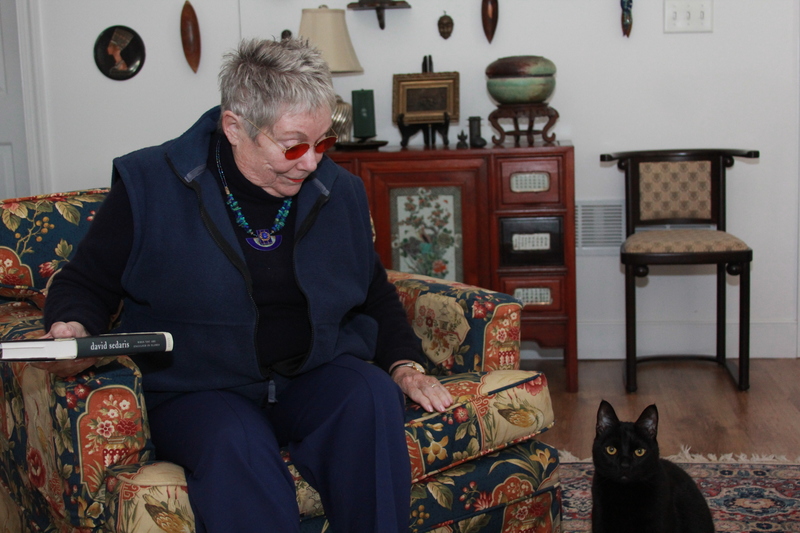Finer: A career of helping others age gracefully
Jackie Finer's Lewes home is a far cry from the Watergate duplex she once owned. Gone are the famous neighbors and their infamous controversies. Now she has time to reflect and embark on a new effort to help Cape Region seniors stay in their homes as long as they can.
Finer first moved to Lewes in 1987 with her second husband, Leslie. The couple bought a condo in the Breakwater development after falling in love with Lewes' cozy surroundings.
"We loved Lewes. My husband's own family house was in Lewes, England, and I think it reminded him of that," Finer said.
The couple moved to a home on Burton Avenue in 2004 where Finer cared for her husband as he battled cancer. He passed away in 2010. Following a period of healing, Finer has turned her energy toward developing the village concept in Lewes – developing needed services so residents can remain in their homes as they grow older.
It's her latest passion, yet it caps a lifetime of work in the field of gerontology. As a young woman growing up in the 1950s, options for women were limited: nursing and teaching with raising children rounding out the list.
A chance dinner party when she was 24, however, opened a door to something totally new to her.
"I stumbled into the aging field," she said.
Baltimore roots
Finer grew up in a conservative, Catholic family in Baltimore. She attended Mount de Sales Academy for high school and later Notre Dame University of Maryland for some college.
"My high school was very rigid. You were either step lock with the administration or troublesome. I was considered troublesome," she said.
Notre Dame was visionary and progressive compared to her high school years, but she left college at age 19 to marry her sweetheart, who was heading off to the Korean War.
"I thought I'd never see him again," Finer said.
Shortly after marrying, she gave birth to her first son, Pearson Sunderland III, named after his father. A second son, William Tippett Sunderland, arrived a couple of years later.
In her spare time, the mother of two did volunteer work while her husband ran a carpet business and later car dealerships.
Much of the volunteer work those days revolved around children. But after two miscarriages, Finer said child-related work was emotionally painful for her.
Through some social connections, she found her niche. After a dinner party conversation, a couple of research doctors asked her to help with a longevity study, and she jumped at the chance.
"That's where I landed," she said.
The field of gerontology was in its infancy; Finer was part of it from the beginning.
Senior citizen services
She left the world of research in 1960 for more concrete pursuits. Literally.
Throughout the 1960s, she headed a group of volunteers seeking public support for a senior citizen center in downtown Baltimore. It took three times to convince politicians and local leaders to support the project, and finally voters approved a $5 million bond referendum for the new center. The Waxter Center stands today and is a reminder to Finer of the importance of teamwork.
"You have to bring the group along to fill in areas where the leader is wanting and get on with it," she said.
At age 37, inspired by her success with the Waxter Center, Finer interviewed for and landed her first job.
"I was 37 years old and my knees were shaking. But it changed my life greatly," she said.
She worked for 18 years on the National Council on Aging, eventually becoming founding director of the National Center on Arts and Older Americans.
Her new job took her across the country creating art programs for senior citizens at homes and centers.
Her family began vacationing at Indian Beach during that time and bought the last lot left for sale on McKean Street in 1969. The house was completed in 1970.
"It still stands today," Finer said. "Everything was done by hand."
Her family of four spent weekends at Indian Beach, but Finer's job with its traveling took a toll on her marriage. She and her husband divorced in 1983.
"When we divorced, the agreement was that the home would go to the boys. It was a lovely family home," she said.
Watergate etc.
Not only did her job require a great deal of travel, it kept her in Washington, D.C., as well. Finer bought a duplex in a trendy building with views of the Potomac River before it became a household name – Watergate. John Dean and H.R. Haldeman were among the Nixon White House staffers who lived on her hallway. When news of the break-in broke, Finer said, paparazzi camped outside the building.
"When you drove by they'd look in your car and yell, asking if anyone was inside," she said.
She kept the duplex for a couple of decades – getting the chance to experience another D.C. scandal with a Watergate connection. This time, Clinton White House intern Monica Lewinsky was at the center of it. Finer said she would pass Lewinsky in the hall or elevator and said she doesn't believe Lewinsky was an innocent victim.
Toward the end of her career in Washington, Finer reconnected with a former BBC reporter whom she met years earlier in England. Leslie Finer earned accolades for his coverage of the 1967 military junta in Greece. He later moved to Washington as editor of the Greek embassy newsletter.
But it was his search for more information on Alzheimer's - a disease plaguing his then-wife - that brought Leslie and Jackie together.
A mutual friend suggested that Leslie ask Jackie for more information on Alzheimer's disease - a little-known condition at the time. The two began spending time together, which grew into a serious relationship when Leslie became a widower. They married in 1991.
Village concept
Now retired, Finer has thrown herself into promoting the village concept. The idea emerged in the early 2000s to enable people to remain in their homes and communities as they age.
Finer tapped into her organizational talents by founding the Greater Lewes Village concept with the help of community volunteers such as Barbara Vaughan, Maryanne Murray and Jim Falk.
She stepped down as founding president in November but continues to work for the group. The group recently sent out a survey to area residents to gauge community opinion on the village concept. Results are pending, she said.
"The mission of the village model is to help our neighbors in Lewes and adjacent communities to stay in their homes as long as possible and stay connected to the community," she said.
Based on her track record, she won't stop until it's done.
Melissa Steele is a staff writer covering the state Legislature, government and police. Her newspaper career spans more than 30 years and includes working for the Delaware State News, Burlington County Times, The News Journal, Dover Post and Milford Beacon before coming to the Cape Gazette in 2012. Her work has received numerous awards, most notably a Pulitzer Prize-adjudicated investigative piece, and a runner-up for the MDDC James S. Keat Freedom of Information Award.

























































